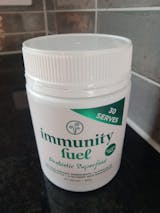I started using immunity fuel about 6 years ago and noticed the improvements in my digestion within 24 hours. I don't use any other probiotics and take this with me when I am away from home.
I have told other people about it to. There are never any problems with deliveries. A happy customer
Very satisfied customer
Consider it the best Probiotic on the market - great spectrum of bacteria.
Take it whenever have had to take a course of antibiotics & because immunosuppressed that is quite frequently!
I wish I could buy the capsules locally in CHCH rather than having a order on-line which incurs extra expense for P&P
After trying a range of probiotics, this one was by far the easiest and best to use. Thank you.
This is the only probiotic I've found that reduces bloating effectively. I love that it includes so many nutritious ingredients.
Since starting to take these, I have noticed that my mood and sleep has improved and its starting to look that i am becoming more insulin sensitive as my gut microbiohm improves
This stuff is magic. Can’t do without it. My gut health has improved markedly.. highly recommend it.
I have diverticulitis so these tablets have helped me cope with this immensely. Keep everything regular! Will definitely continue using.
High quality probiotic, thankfully this company is Concerned about good health and making high quality goos!
Excellent products. I stopped taking it for a while and kept getting sick and picking up every bug. Haven't been sick since taking it again. Love it and have recommended it to my friend.


